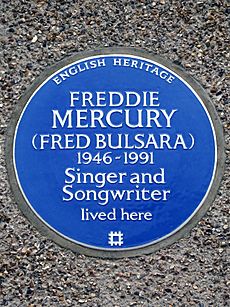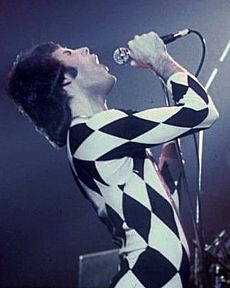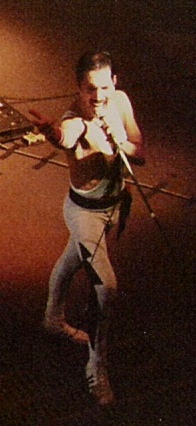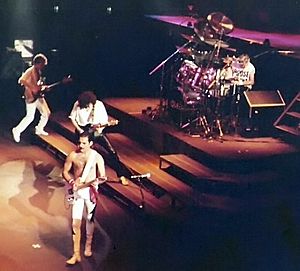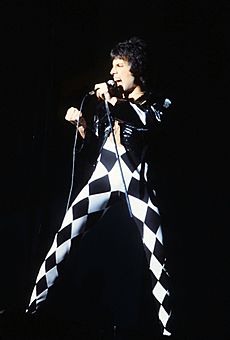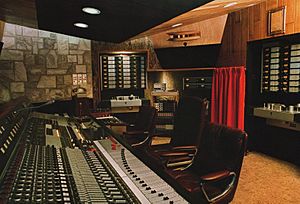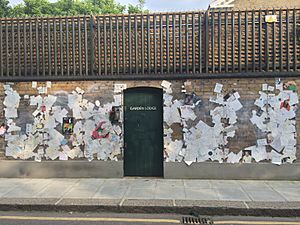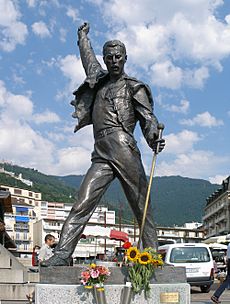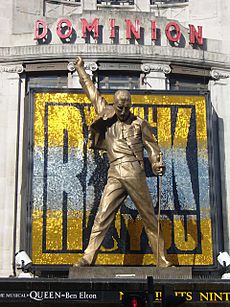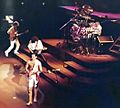Freddie Mercury facts for kids
Quick facts for kids
Freddie Mercury
|
|
|---|---|
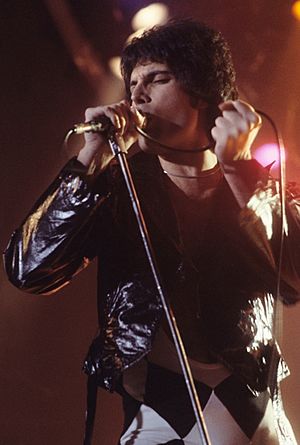
Mercury performing with Queen in New Haven, Connecticut, 1977
|
|
| Born |
Farrokh Bulsara
5 September 1946 Stone Town, Zanzibar
|
| Died | 24 November 1991 (aged 45) Kensington, London, England
|
| Cause of death | Complications from an illness |
| Nationality | British |
| Other names |
|
| Alma mater |
|
| Occupation |
|
| Years active | 1969–1991 |
| Partner(s) |
|
| Musical career | |
| Genres | Rock |
| Instruments |
|
| Labels | |
| Signature | |
 |
|
Freddie Mercury (born Farrokh Bulsara; 5 September 1946 – 24 November 1991) was a British singer and songwriter. He became famous worldwide as the lead singer of the rock band Queen. Many people consider him one of the greatest singers in rock history. He was known for his exciting stage presence and amazing four-octave vocal range. Mercury changed what it meant to be a rock frontman with his dramatic style. He also greatly influenced Queen's artistic direction.
Born in 1946 in Zanzibar, Freddie Mercury had Parsi-Indian parents. He went to English-style boarding schools in India from age eight. After secondary school, he returned to Zanzibar. In 1964, his family moved to Middlesex, England, to escape the Zanzibar Revolution. Having studied and written music for many years, he formed Queen in 1970. He started the band with guitarist Brian May and drummer Roger Taylor.
Mercury wrote many hit songs for Queen. These include "Killer Queen", "Bohemian Rhapsody", "Somebody to Love", "We Are the Champions", "Don't Stop Me Now", and "Crazy Little Thing Called Love". His lively stage shows often involved the audience. A great example is his performance at the 1985 Live Aid concert. He also had a solo career and worked as a producer and guest musician for other artists.
Mercury was diagnosed with a serious illness in 1987. He continued to record music with Queen. He appeared on their final album, Made in Heaven (1995), which was released after his death. He announced his illness the day before he passed away from complications, in 1991 at the age of 45. In 1992, a tribute concert was held for him at Wembley Stadium. This concert helped raise awareness about the illness. His career with Queen was shown in the 2018 movie Bohemian Rhapsody.
As a member of Queen, Mercury was honored after his death. He was inducted into the Rock and Roll Hall of Fame in 2001. He also joined the Songwriters Hall of Fame in 2003 and the UK Music Hall of Fame in 2004. In 1990, he and the other Queen members won the Brit Award for Outstanding Contribution to British Music. One year after his death, Mercury received this award individually. In 2005, Queen won an Ivor Novello Award for Outstanding Song Collection. This award came from the British Academy of Songwriters, Composers, and Authors. In 2002, Mercury was voted number 58 in the BBC's poll of the 100 Greatest Britons.
Contents
Freddie Mercury's Early Life
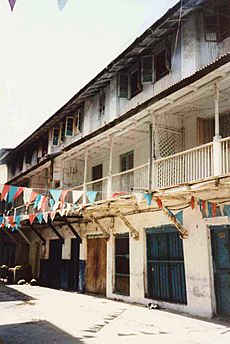
Freddie Mercury was born Farrokh Bulsara in Stone Town, Zanzibar. This was a British protectorate at the time, now part of Tanzania. His birthday was 5 September 1946. His parents, Bomi (1908–2003) and Jer Bulsara (1922–2016), were from the Parsi community in western India. The Bulsara family originally came from the city of Bulsar (now Valsad) in Gujarat. Freddie also had a younger sister named Kashmira, born in 1952.
His family moved to Zanzibar because his father, Bomi, worked as a cashier for the British Colonial Office. As Parsis, the Bulsaras followed the Zoroastrianism religion. Mercury was born with four extra front teeth. He believed these teeth helped him have his amazing vocal range. Since Zanzibar was a British protectorate until 1963, Mercury was born a British subject. On 2 June 1969, he became a citizen of the United Kingdom after his family moved to England.
Mercury spent most of his childhood in India. He started taking piano lessons at age seven while living with relatives. In 1954, at age eight, Mercury was sent to St. Peter's School. This was a British-style boarding school for boys near Bombay. At age 12, he formed a school band called the Hectics. They played songs by rock and roll artists like Cliff Richard and Little Richard. One of his old bandmates said that Freddie only listened to and played Western pop music. A friend remembered that he could listen to the radio and then play what he heard on the piano. It was also at St. Peter's where he began to call himself "Freddie." In February 1963, he moved back to Zanzibar to live with his parents.
In the spring of 1964, Mercury and his family moved to England. They left Zanzibar to escape the violence of the Zanzibar Revolution. This revolution was against the Sultan of Zanzibar and his mostly Arab government. Thousands of people of Arab and Indian descent were killed. The family moved to Feltham, Middlesex, which is about 13 miles (21 km) west of central London. The Bulsaras first lived at 19 Hamilton Close, then briefly at 122 Hamilton Road. They finally settled in a small house at 22 Gladstone Avenue in late October. After studying art at Isleworth Polytechnic, Mercury studied graphic art and design at Ealing Art College. He graduated with a diploma in 1969. He later used these skills to design the special crest for his band, Queen.
After graduating, Mercury joined several bands. He also sold old Edwardian clothes and scarves at Kensington Market in London with Roger Taylor. Taylor remembered, "Back then, I didn't really know him as a singer—he was just my friend. My crazy friend! If there was fun to be had, Freddie and I were usually involved." He also worked as a baggage handler at Heathrow Airport. Other friends from that time remember him as a quiet and shy young man who loved music. In 1969, he joined a Liverpool band called Ibex, which later changed its name to Wreckage. This band played "very Hendrix-style, heavy blues." He briefly lived above the Dovedale Towers, a pub on Penny Lane in Liverpool. When this band didn't succeed, he joined an Oxford band called Sour Milk Sea. But by early 1970, this group also broke up.
In April 1970, Mercury joined guitarist Brian May and drummer Roger Taylor. He became the lead singer of their band, Smile. Bassist John Deacon joined them in 1971. Even though the other members and the band's management had doubts, Mercury chose the name "Queen" for the new band. He later said, "It's very royal, and it sounds great. It's a strong name, very universal and immediate." Around the same time, he legally changed his last name, Bulsara, to Mercury. This was inspired by the line "Mother Mercury, look what they've done to me" from his song "My Fairy King".
Before Queen's first album was released, Mercury designed the band's logo, known as the "Queen crest." The logo combines the zodiac signs of the four band members. There are two lions for Deacon and Taylor (sign Leo), a crab for May (Cancer), and two fairies for Mercury (Virgo). The lions hug a fancy letter Q, the crab sits on top of the letter with flames above it, and the fairies are under each lion. A crown is inside the Q, and a huge phoenix watches over the whole logo. The Queen crest looks a bit like the Royal coat of arms of the United Kingdom, especially with the lion supporters.
Freddie Mercury's Artistic Talents
Vocal Abilities
Freddie Mercury's normal speaking voice was in the baritone range. However, he sang most songs in the tenor range. His known vocal range went from a low F (F2) to a high F (F6). He could also sing very powerfully up to a high F (F5). One writer described his voice as changing quickly. It could go from a deep, rough rock sound to a soft, clear tenor, and then to a high, perfect coloratura sound. Spanish soprano Montserrat Caballé, who recorded an album with Mercury, said that "the difference between Freddie and almost all the other rock stars was that he was selling the voice."
The Who's lead singer Roger Daltrey called Mercury "the best expert rock 'n' roll singer of all time." He added that Mercury "could sing anything in any style." Daltrey also said, "He could change his style from line to line and, God, that's an art. And he was brilliant at it." Andrew Lloyd Webber, who created the musical Jesus Christ Superstar, said that the lead role needed someone with "enormous charisma." He also said the person needed to be "a genuine, genuine rock tenor. Really think Freddie Mercury, I mean that's the kind of range we're talking about."
In 2016, a group of researchers studied Mercury's voice. They wanted to understand why his voice was so appealing. Led by Professor Christian Herbst, the team found that Mercury had a faster vibrato (a trembling effect in the voice) and used subharmonics. These were unique features of his voice compared to opera singers. The researchers studied vocal samples from 23 Queen recordings, his solo work, and interviews. They also used a special camera to study a rock singer who tried to imitate Mercury's voice.
Songwriting Skills
Mercury wrote 10 of the 17 songs on Queen's Greatest Hits album. These include "Bohemian Rhapsody", "Seven Seas of Rhye", "Killer Queen", "Somebody to Love", "Good Old-Fashioned Lover Boy", "We Are the Champions", "Bicycle Race", "Don't Stop Me Now", "Crazy Little Thing Called Love", and "Play the Game". In 2003, Mercury was honored after his death by being inducted into the Songwriters Hall of Fame with the rest of Queen. In 2005, all four band members received an Ivor Novello Award for Outstanding Song Collection. This award came from the British Academy of Songwriters, Composers, and Authors.
A key part of his songwriting was the wide variety of music styles he used. These included rockabilly, progressive rock, heavy metal, gospel, and disco. He explained in a 1986 interview, "I hate doing the same thing again and again. I like to see what's happening now in music, film and theatre and use all of those things." Compared to many popular songwriters, Mercury often wrote musically complex songs. For example, "Bohemian Rhapsody" has a unique structure and uses many chords. He also wrote six songs from Queen II that have many key changes and complex parts. On the other hand, "Crazy Little Thing Called Love" has only a few chords. Even though Mercury often wrote very detailed harmonies, he said he could barely read music. He composed most of his songs on the piano and used many different musical keys.
Live Performances
Mercury was famous for his live shows. He often performed for huge crowds in stadiums around the world. He had a very dramatic style that often got the audience involved. A writer for The Spectator said he was "a performer out to tease, shock and ultimately charm his audience." David Bowie, who performed at the Freddie Mercury Tribute Concert and recorded "Under Pressure" with Queen, praised Mercury's stage style. He said, "Of all the more theatrical rock performers, Freddie took it further than the rest... he took it over the edge." Queen guitarist Brian May wrote that Mercury could make "the last person at the back of the furthest stand in a stadium feel that he was connected." Mercury's main stage prop was a broken microphone stand. He accidentally broke it during an early show and realized it could be used in many ways.
One of Mercury's most famous performances with Queen was at Live Aid in 1985. Music experts have voted Queen's performance at this event as the greatest live rock performance ever. The results were shown on a TV show called "The World's Greatest Gigs." Mercury's powerful, long note during the a cappella part became known as "The Note Heard Round the World." A critic reviewing Live Aid in 2005 wrote, "Those who make lists of Great Rock Frontmen and give the top spots to Mick Jagger, Robert Plant, etc. are all wrong. Freddie, as shown by his amazing Live Aid performance, was easily the most godlike of them all." Photographer Denis O'Regan captured a famous pose of Mercury on stage during his last tour with Queen in 1986. He said, "Freddie was a once-in-a-lifetime showman." Queen roadie Peter Hince stated, "It wasn't just about his voice but the way he controlled the stage. For him it was all about interacting with the audience and knowing how to get them on his side. And he gave everything in every show."
Throughout his career, Mercury performed about 700 concerts worldwide with Queen. A notable thing about Queen concerts was their huge size. He once explained, "We're the Cecil B. DeMille of rock and roll, always wanting to do things bigger and better." The band was the first to play in South American stadiums. They broke world records for concert attendance in the Morumbi Stadium in São Paulo in 1981. In 1986, Queen also played behind the Iron Curtain in Budapest. They performed for 80,000 people, one of the biggest rock concerts ever in Eastern Europe. Mercury's final live performance with Queen was on 9 August 1986 at Knebworth Park in England. It had an estimated attendance of up to 200,000 people. A week before Knebworth, May remembered Mercury saying, "I'm not going to be doing this forever. This is probably the last time." As the British national anthem "God Save the Queen" played at the end of the concert, Mercury's last act on stage was to wear a robe, hold a golden crown high, and wave goodbye to the crowd.
Playing Instruments
As a young boy in India, Freddie Mercury had formal piano lessons until he was nine. Later, while living in London, he learned guitar. Much of the music he liked was guitar-focused. His favorite artists at the time were the Who, the Beatles, Jimi Hendrix, David Bowie, and Led Zeppelin. He often made fun of his own skills on both instruments. However, Brian May says Mercury "had a wonderful touch on the piano." May added, "He could play what came from inside him like nobody else – incredible rhythm, incredible passion and feeling." Keyboardist Rick Wakeman praised Mercury's piano playing. He said Mercury "discovered [the piano] for himself" and successfully wrote many Queen songs on it. From the early 1980s, Mercury started using guest keyboard players a lot. Most notably, he worked with Fred Mandel for his first solo project. From 1982, Mercury worked with Morgan Fisher, and from 1985 onwards, he worked with Mike Moran (in the studio) and Spike Edney (in concerts).
Mercury played the piano in many of Queen's most popular songs. These include "Killer Queen", "Bohemian Rhapsody", "Good Old-Fashioned Lover Boy", "We Are the Champions", "Somebody to Love", and "Don't Stop Me Now". He used large concert grand pianos (like a Bechstein) and sometimes other keyboard instruments like the harpsichord. From 1980 onwards, he also often used synthesisers in the studio. Brian May says that Mercury used the piano less over time because he wanted to walk around on stage and entertain the audience. Although he wrote many parts for the guitar, Mercury only had basic skills on the instrument. Songs like "Ogre Battle" and "Crazy Little Thing Called Love" were composed on the guitar. Mercury even played rhythm guitar for "Crazy Little Thing Called Love" on stage and in the studio.
Solo Career
Besides his work with Queen, Mercury released two solo albums and several singles. While his solo work wasn't as commercially successful as most Queen albums, his two albums and several singles reached the top 10 in the UK Music Charts. His first solo effort was in 1972 under the name Larry Lurex. At that time, Queen was recording their first album. The studio engineer, Robin Geoffrey Cable, asked Mercury to sing lead vocals on "I Can Hear Music" and "Goin' Back". Both songs were released as a single in 1973. Eleven years later, Mercury contributed to the soundtrack for the restored 1927 film Metropolis. The song "Love Kills" was written for the film by Giorgio Moroder with Mercury. It reached number 10 in the UK Singles Chart in 1984.
Mercury's two full albums outside the band were Mr. Bad Guy (1985) and Barcelona (1988). His first album, Mr. Bad Guy, reached the top ten of the UK Album Charts. In 1993, a new version of "Living on My Own", a single from the album, reached number one on the UK Singles Charts after his death. The song also earned Mercury an Ivor Novello Award from the British Academy of Songwriters, Composers and Authors. AllMusic critic Eduardo Rivadavia called Mr. Bad Guy "outstanding from start to finish." He felt that Mercury "did a commendable job of stretching into uncharted territory." The album heavily used synthesizers, which was different from earlier Queen albums.
His second album, Barcelona, was recorded with Spanish soprano singer Montserrat Caballé. It mixed popular music with opera. Many critics weren't sure what to think of the album; one called it "the most bizarre CD of the year." However, the album was a commercial success. The album's title track reached No. 8 in the UK and was also a hit in Spain. The title track was played a lot as the official song of the 1992 Summer Olympics in Barcelona. Caballé sang it live at the Olympics opening with Mercury's part played on a screen. She sang it again before the start of the 1999 UEFA Champions League Final in Barcelona.
Besides his two solo albums, Mercury released several singles. This included his own version of "The Great Pretender" by the Platters, which reached No. 5 in the UK in 1987. In September 2006, a collection of Mercury's solo work was released in the UK. This was to celebrate what would have been his 60th birthday. The album reached the UK top 10. In 2012, Freddie Mercury: The Great Pretender, a documentary film about Mercury's solo career, was shown on BBC One.
From 1981 to 1983, Mercury recorded several songs with Michael Jackson. These included a demo of "State of Shock", "Victory", and "There Must Be More to Life Than This". None of these were officially released at the time, though unofficial recordings exist. Jackson later recorded "State of Shock" with Mick Jagger for the Jacksons' album Victory. Mercury included his solo version of "There Must Be More To Life Than This" on his Mr. Bad Guy album. "There Must Be More to Life Than This" was later re-worked by Queen and released on their album Queen Forever in 2014. In addition to working with Michael Jackson, Mercury and Roger Taylor sang on the title track for Billy Squier's 1982 album, Emotions in Motion. They later contributed to two songs on Squier's 1986 album, Enough Is Enough. In 2020, Mercury's music video for "Love Me Like There's No Tomorrow" was nominated for Best Animation at the Berlin Music Video Awards.
Freddie Mercury's Personal Life
Relationships and Friendships
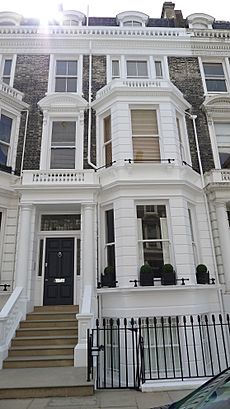
In the early 1970s, Mercury had a long relationship with Mary Austin. He met her through guitarist Brian May. Austin, born in Fulham, London, met Mercury in 1969 when she was 19 and he was 24. This was a year before Queen was formed. He lived with Austin for several years in West Kensington, London. In December 1976, they separated. Mercury moved out of their shared flat and bought Austin her own place near his new home at 12 Stafford Terrace, Kensington.
Mercury and Austin remained friends for many years. Mercury often called her his only true friend. In a 1985 interview, he said of Austin: "All my lovers asked me why they couldn't replace Mary, but it's simply impossible. The only friend I've got is Mary, and I don't want anybody else. To me, she was my common-law wife. To me, it was a marriage. We believe in each other, that's enough for me." Mercury's final home, Garden Lodge, was a large 28-room Georgian mansion in Kensington. It had a quarter-acre garden surrounded by a high brick wall. Austin helped him pick out this house. Austin married artist Piers Cameron and they have two children. Mercury was the godfather of her older son, Richard. In his will, Mercury left his London home to Austin. He had told her, "You would have been my wife, and it would have been yours anyway."
By 1985, he started another long relationship with Irish hairdresser Jim Hutton (1949–2010). Mercury called Hutton his husband. Mercury described their relationship as one built on comfort and understanding. He said he "honestly couldn't ask for better." Hutton lived with Mercury for the last seven years of his life. He cared for Mercury during his illness and was with him when he passed away. Mercury wore a gold wedding band, given to him by Hutton in 1986, until the end of his life. He was cremated wearing it. Hutton later moved from London to the bungalow he and Mercury had built in Ireland.
Radio disc jockey Kenny Everett met Mercury in 1974. He invited the singer onto his Capital London breakfast show. As two of Britain's most exciting entertainers, they became close friends. In 1975, Mercury visited Everett, bringing an early copy of the single "Bohemian Rhapsody". Everett played the song, even though he doubted any station would play the six-minute track. He often played the song, saying, "Oops, my finger must've slipped." Once, Everett played the song fourteen times in one weekend. Capital Radio's phones were flooded with calls asking when the song would be released.
During the 1970s, Everett became a trusted advisor to Mercury, and Mercury was Everett's confidant. By 1985, their friendship had some difficulties. In 1989, as their health declined, Mercury and Everett became friends again.
Personality and Interests
Even though he had a very dramatic stage personality, Mercury was shy and quiet when he wasn't performing. This was especially true around people he didn't know well. He gave very few interviews. He once said about himself: "When I'm performing I'm an extrovert, yet inside I'm a completely different man." BBC music broadcaster Bob Harris added that Mercury was "lovely, bright, sensitive, and quite vulnerable." On stage, Mercury loved the energy from his audience.
Mercury never talked about his background with journalists. The closest he came was when asked about his unusual stage presence. He said, "that's something inbred, it's a part of me. I will always walk around like a Persian popinjay". This was a subtle hint to his Indian Parsi background. The young Bulsara felt a connection to Britain before arriving in England. He was greatly influenced by British fashion and music trends while growing up. According to his longtime assistant Peter Freestone, "if Freddie had his way, he would have been born aged 18 in Feltham." Harris stated, "One of the things about Freddie was that he was very polite and quite 'English'." His dramatic fashion sense and the rise of glam rock in the UK in the early 1970s led Mercury to wear outfits designed by Zandra Rhodes.
When Melody Maker asked him in 1981 if rock stars should use their power to improve the world, Mercury replied, "Leave that to the politicians." He added, "John Lennon was one. Because of his status, he could do that kind of preaching and affect people's thoughts. But to do this you have to have a certain amount of intellect and magic together, and the John Lennons are few and far between. People with mere talent, like me, have not got the ability or power." Mercury dedicated a song to the former member of The Beatles. The song, "Life Is Real (Song for Lennon)", is on the 1982 album Hot Space. Mercury did sometimes express his worries about the world in his lyrics. His most notable "message" songs are "Under Pressure", "Is This the World We Created...?", "There Must Be More to Life Than This", "The Miracle", and "Innuendo".
Mercury cared for at least ten cats throughout his life. These included Tom, Jerry, Oscar, Tiffany, Dorothy, Delilah, Goliath, Miko, Romeo, and Lily. He was against breeding cats for specific features. All but Tiffany and Lily, which were gifts, were adopted from the Blue Cross. Mercury "cared as much for these beloved animals as for any human life." He showed his love by having artist Ann Ortman paint portraits of each of them. Mercury wrote a song for Delilah, "his favorite cat of all," which appeared on the Queen album Innuendo. Mercury dedicated his 1985 solo album Mr. Bad Guy to Jerry and his other cats. It reads, "This album is dedicated to my cat Jerry—also Tom, Oscar, and Tiffany and all the cat lovers across the universe—screw everybody else!"
In 1987, Mercury celebrated his 41st birthday at the Pikes Hotel, Ibiza, Spain. This was several months after he learned he had a serious illness. Mercury found great comfort at the hotel and was a close friend of the owner, Anthony Pike. Pike described Mercury as "the most beautiful person I've ever met in my life. So entertaining and generous." The birthday party, held on 5 September 1987, was described as "the most incredible example of excess the Mediterranean island had ever seen." About 700 people attended. A cake shaped like Antoni Gaudi's Sagrada Família was provided. The original cake fell apart and was replaced with a two-meter-long sponge cake decorated with notes from Mercury's song "Barcelona." The bill, which included 232 broken glasses, was given to Queen's manager, Jim Beach. Before he passed away, Mercury told Beach, "You can do what you want with my music, but don't make me boring."
Illness and Passing
Mercury showed signs of an illness as early as 1982. Authors Matt Richards and Mark Langthorne wrote in their book Somebody to Love: The Life, Death, and Legacy of Freddie Mercury that Mercury secretly visited a doctor in New York City. This was to check a white spot on his tongue a few weeks before Queen's last American performance on Saturday Night Live on 25 September 1982.
In October 1986, British newspapers reported that Mercury had his blood tested at a clinic. According to his partner, Jim Hutton, Mercury was diagnosed with a serious illness in late April 1987. Around that time, Mercury said in an interview that he had tested negative.
The British press continued to spread rumors over the next few years. These were fueled by Mercury's increasingly thin appearance, Queen not touring, and reports from others to tabloid newspapers. By 1990, rumors about Mercury's health were widespread. At the 1990 Brit Awards on 18 February, Mercury made his final stage appearance. He joined the rest of Queen to accept the Brit Award for Outstanding Contribution to British Music.
Mercury and his close friends and colleagues kept denying the stories. Some have suggested that Mercury could have helped raise awareness by speaking earlier about his illness. Mercury kept his condition private to protect those closest to him. May later confirmed that Mercury had told the band about his illness much earlier. The music video for "These Are the Days of Our Lives" was filmed in May 1991. It shows a very thin Mercury in his final scenes in front of the camera. The video's director, Rudi Dolezal, said, "The illness was never a topic. We never discussed it. He didn't want to talk about it." He added, "Most of the people didn't even 100 percent know if he had it, apart from the band and a few people in the inner circle. He always said, 'I don't want to put any burden on other people by telling them my tragedy.'" The rest of the band was ready to record whenever Mercury felt able to come into the studio, for an hour or two at a time. May said of Mercury: "He just kept saying. 'Write me more. Write me stuff. I want to just sing this and do it and when I am gone you can finish it off.' He had no fear, really." Justin Shirley-Smith, the assistant engineer for those last sessions, said: "This is hard to explain to people, but it wasn't sad, it was very happy. He [Freddie] was one of the funniest people I ever encountered. I was laughing most of the time, with him. Freddie was saying [of his illness] 'I'm not going to think about it, I'm going to do this.'"
After finishing his work with Queen in June 1991, Mercury went to his home in Kensington, West London. His former partner, Mary Austin, was a great comfort in his final years. In his last few weeks, she visited regularly to care for him. Near the end of his life, Mercury began to lose his sight. He became so weak that he could not leave his bed. Mercury chose to speed up his passing by refusing medication and only taking painkillers.
Freddie Mercury's Death
On the evening of 24 November 1991, about 24 hours after making a public statement, Mercury passed away at age 45 at his home in Kensington. The cause of death was bronchial pneumonia resulting from his illness. His close friend Dave Clark was with him when Mercury died. Austin called Mercury's parents and sister to share the news. This news reached newspaper and television crews early on 25 November.
Mercury's funeral service was held on 27 November 1991. A Zoroastrian priest led the service at West London Crematorium. He is remembered there by a plaque with his birth name. His family and 35 close friends attended the service. These included Elton John and the members of Queen. His coffin was carried into the chapel to the sounds of "Take My Hand, Precious Lord"/"You've Got a Friend" by Aretha Franklin. Following Mercury's wishes, Mary Austin took his cremated remains and buried them in a secret location. Only Austin is believed to know where his ashes are, and she has said she will never tell.
Mercury spent and donated much of his money to charity during his lifetime. His estate was valued at about £8 million when he passed away. He left his home, Garden Lodge, and the nearby Mews, as well as 50% of his privately owned shares, to Mary Austin. His sister, Kashmira Cooke, received 25%, as did his parents, Bomi and Jer Bulsara. Cooke received her parents' share after their deaths. He left £500,000 to Joe Fannelli, £500,000 to Jim Hutton, £500,000 to Peter Freestone, and £100,000 to Terry Giddings. Mercury never drove because he didn't have a license. He was often driven around London in his Rolls-Royce Silver Shadow from 1979 until his death. The car went to his sister Kashmira. She made it available for public events, including the musical We Will Rock You premiere in 2002. It was later sold at auction in 2013 for £74,600.
After his passing, the outer walls of Garden Lodge in Logan Place became a special place for fans. Mourners paid tribute by writing messages on the walls. Three years later, Time Out magazine reported that "the wall outside the house has become London's biggest rock 'n' roll shrine." Fans continued to visit and leave messages until 2017, when Austin had the wall cleared. Hutton was involved in a 2000 book about Mercury, Freddie Mercury, the Untold Story. He also gave an interview for The Times in September 2006 for what would have been Mercury's 60th birthday.
Freddie Mercury's Legacy
Lasting Popularity
Freddie Mercury is seen as one of the greatest lead singers in rock music history. He was known for his exciting stage presence and amazing four-octave vocal range. Mercury changed what it meant to be a rock frontman. His very theatrical style influenced Queen's artistic direction.
It's not clear how much Mercury's passing increased Queen's popularity. In the United States, where Queen's popularity had slowed in the 1980s, sales of Queen albums went up a lot in 1992, the year after his death. In 1992, one American critic noted, "What cynics call the 'dead star' factor had come into play—Queen is in the middle of a major comeback." The movie Wayne's World, which featured "Bohemian Rhapsody", also came out in 1992. According to the Recording Industry Association of America, Queen had sold 34.5 million albums in the United States by 2004. About half of these were sold after Mercury's death in 1991.
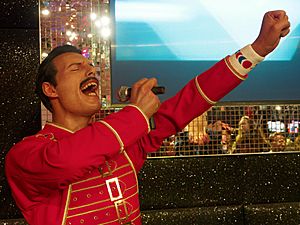
Estimates for Queen's total worldwide record sales are as high as 300 million. In the United Kingdom, Queen has spent more weeks on the UK Album Charts than any other music act, including the Beatles. Queen's Greatest Hits is the best-selling album of all time in the United Kingdom. Two of Mercury's songs, "We Are the Champions" and "Bohemian Rhapsody", have been voted the greatest songs of all time in major polls. Both songs have been added to the Grammy Hall of Fame; "Bohemian Rhapsody" in 2004 and "We Are the Champions" in 2009. In October 2007, the video for "Bohemian Rhapsody" was voted the greatest of all time by readers of Q magazine.
Since his passing, Queen was inducted into the Rock and Roll Hall of Fame in 2001. All four band members were inducted into the Songwriters Hall of Fame in 2003. Their Rock Hall of Fame description says, "in the golden era of glam rock and gorgeously hyper-produced theatrical shows that defined one branch of '70s rock, no group came close in either concept or execution to Queen." The band was among the first groups inducted into the UK Music Hall of Fame in 2004. Mercury was individually given the Brit Award for Outstanding Contribution to British Music in 1992. They received the Ivor Novello Award for Outstanding Song Collection in 2005. In 2018, they were given the Grammy Lifetime Achievement Award.
Posthumous Queen Album
In November 1995, Mercury appeared on Queen's final studio album Made in Heaven, released after his death. The album included Mercury's last recordings from 1991 that had not been released before. It also had unused recordings from earlier years and new versions of solo songs by the other band members. The album cover shows a statue of Freddie Mercury overlooking Lake Geneva. It is combined with an image of Mercury's Duck House lake cabin, which he had rented. This is where he wrote and recorded his last songs at Mountain Studios. The album cover says, "Dedicated to the immortal spirit of Freddie Mercury."
The album features songs like "Too Much Love Will Kill You" and "Heaven for Everyone". It also contains "Mother Love", which was the last song Mercury recorded vocals for before he passed away. He finished it using a drum machine. May, Taylor, and Deacon later added the instruments. After singing most of the song, Mercury told the band he "wasn't feeling that great" and said, "I will finish it when I come back next time." He never made it back to the studio, so May later recorded the final part of the song.
Tributes to Freddie Mercury
A statue in Montreux, Switzerland, made by sculptor Irena Sedlecká, was put up to honor Mercury. It is almost 10 feet (3 meters) high and overlooks Lake Geneva. Mercury's father and Montserrat Caballé unveiled it on 25 November 1996. Bandmates Brian May and Roger Taylor were also there. Since 2003, fans from around the world have gathered in Switzerland every year. They pay tribute to the singer as part of the "Freddie Mercury Montreux Memorial Day" on the first weekend of September.
In 1997, the three remaining members of Queen released "No-One but You (Only the Good Die Young)". This song was dedicated to Mercury and everyone who passes away too soon. In 1999, a Royal Mail stamp with an image of Mercury on stage was issued in his honor. This was part of the UK postal service's Millennium Stamp series. In 2009, a star honoring Mercury was unveiled in Feltham, west London. This is where his family moved when they came to England in 1964. His mother Jer Bulsara and Queen bandmate May unveiled the star on Feltham High Street.
A statue of Mercury stood above the entrance to the Dominion Theatre in London's West End. It was there from May 2002 to May 2014 for Queen and Ben Elton's musical We Will Rock You. A tribute to Queen was displayed at the Fremont Street Experience in downtown Las Vegas throughout 2009 on its video canopy. In December 2009, a large model of Mercury wearing tartan was put on display in Edinburgh. This was to promote the run of We Will Rock You. Sculptures of Mercury often show him wearing a military jacket with his fist in the air. In 2018, GQ magazine called Mercury's yellow military jacket from his 1986 concerts his most famous look. CNN called it "an iconic moment in fashion."
For Mercury's 65th birthday in 2011, Google dedicated its Google Doodle to him. It included an animation set to his song, "Don't Stop Me Now". In their 2012 Rock and Roll Hall of Fame induction speech, Guns N' Roses referred to "the late, great Freddie Mercury." They quoted Mercury's lyrics from "We Are the Champions": "I've taken my bows, my curtain calls, you've brought me fame and fortune and everything that goes with it, and I thank you all."
Tribute was paid to Queen and Mercury at the closing ceremony of the 2012 Summer Olympics in London. The band's performance of "We Will Rock You" with Jessie J began with a video of Mercury's "call and response" routine from his 1986 Wembley Stadium performance. The 2012 crowd at the Olympic Stadium responded just as the original crowd did. The frog genus Mercurana, found in 2013 in Kerala, India, was named as a tribute. This is because Mercury's "vibrant music inspires the authors." The discovery site is very close to where Mercury spent most of his childhood. In 2013, a newly found species of damselfly from Brazil was named Heteragrion freddiemercuryi. This honored the "superb and gifted musician and songwriter whose wonderful voice and talent still entertain millions." This was one of four similar damselflies named after the Queen bandmates, celebrating Queen's 40th anniversary.
On 1 September 2016, an English Heritage blue plaque was unveiled at Mercury's home at 22 Gladstone Avenue in Feltham, west London. His sister, Kashmira Cooke, and Brian May unveiled it. Karen Bradley, the UK Secretary of State for Culture, attended the ceremony. She called Mercury "one of Britain's most influential musicians." She added that he "is a global icon whose music touched the lives of millions of people around the world." On 24 February 2020, a street in Feltham was renamed Freddie Mercury Close. His sister Kashmira attended the ceremony. Until Freddie Mercury Close in Feltham was named, Warsaw was the only city in Europe with a street dedicated to the singer. In January 2020, Queen became the first band to appear on a British coin with Queen Elizabeth II. The commemorative £5 coin was issued by the Royal Mint. It features the instruments of all four band members, including Mercury's Bechstein grand piano and his mic and stand. In April 2022, a life-size statue of Mercury was unveiled on South Korea's resort island of Jeju.
Mercury has been featured in international advertising to represent the UK. In 2001, a cartoon version of Mercury appeared in the Eurostar advertising campaign in France. It was for the Paris to London route, alongside other British music icons like The Beatles, Elton John, Spice Girls, and The Rolling Stones. In September 2017, the airline Norwegian painted a portrait of Mercury on the tail fin of two of its aircraft. This was to mark what would have been his 71st birthday. Mercury is one of the company's six "British tail fin heroes." Others include England's 1966 FIFA World Cup winning captain Bobby Moore, children's author Roald Dahl, novelist Jane Austen, pioneering pilot Amy Johnson, and aviation entrepreneur Sir Freddie Laker.
Importance in Illness Awareness History
As the first major rock star to pass away from complications of his illness, Mercury's death was an important event in the history of the disease. In April 1992, the remaining members of Queen started The Mercury Phoenix Trust. They also organized The Freddie Mercury Tribute Concert for Illness Awareness. This concert celebrated Mercury's life and raised money for research. It took place on 20 April 1992 at London's Wembley Stadium for an audience of 72,000. Many famous guests performed, including Robert Plant (of Led Zeppelin), Roger Daltrey (of the Who), Extreme, Elton John, Metallica, David Bowie, Annie Lennox, Tony Iommi (of Black Sabbath), Guns N' Roses, Elizabeth Taylor, George Michael, Def Leppard, Seal and Liza Minnelli. U2 also appeared via satellite. Elizabeth Taylor spoke of Mercury as "an extraordinary rock star who rushed across our cultural landscape like a comet shooting across the sky." The concert was broadcast live to 76 countries and had an estimated viewing audience of 1 billion people. The Freddie For A Day fundraiser for the Mercury Phoenix Trust happens every year in London. Supporters include comedian Eric Idle and Mel B of the Spice Girls.
The documentary, Freddie Mercury: The Final Act, was shown on BBC Two in 2021. It covered Mercury's last days. It also showed how his bandmates and friends put together the Tribute Concert at Wembley. The film interviewed medical professionals, people who had the illness, and others who knew someone who passed away from it. At the 50th International Emmy Awards in 2022, it won the International Emmy Award for Best Arts Programming.
Appearances in Lists of Influential People
Several popularity polls show that Mercury's reputation may have grown since his passing. For example, in a 2002 vote to find the greatest British people in history, Mercury was ranked 58th in the list of the 100 Greatest Britons. This was broadcast by the BBC. In 2007, he was listed at 52nd in a Japanese national survey of the 100 most influential heroes. In 2008, Rolling Stone ranked Mercury 18th on its list of the Top 100 Singers Of All Time. Mercury was voted the greatest male singer in MTV's 22 Greatest Voices in Music. In 2011, a Rolling Stone readers' poll placed Mercury in second place for the magazine's Best Lead Singers of All Time. In 2015, Billboard magazine placed him second on their list of the 25 Best Rock Frontmen (and Women) of All Time. In 2016, LA Weekly ranked him first on the list of 20 greatest singers of all time, in any music style.
Portrayals on Stage and Screen
On 24 November 1997, a play about Freddie Mercury's life opened in New York City. It was called Mercury: The Afterlife and Times of a Rock God. It showed Mercury after his passing, looking back at his life and searching for his true self. The play was written and directed by Charles Messina. The role of Mercury was played by Khalid Gonçalves and later by Amir Darvish. Billy Squier opened one of the shows with an acoustic performance of a song he wrote about Mercury called "I Have Watched You Fly."
In 2016, a musical called Royal Vauxhall premiered in London. Written by Desmond O'Connor, the musical told stories about nights Mercury, Kenny Everett, and Princess Diana supposedly spent at the Royal Vauxhall Tavern in London in the 1980s. After successful runs in London, the musical went to the Edinburgh Fringe Festival in August 2016, starring Tom Giles as Mercury.
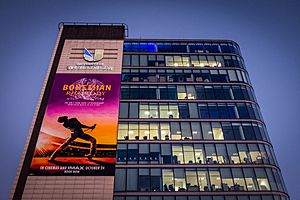
The 2018 biographical film Bohemian Rhapsody became the highest-grossing musical biographical film of all time when it was released. Mercury was played by Rami Malek. Malek won several awards for his performance, including the Academy Award, BAFTA Award, Golden Globe Award, and Screen Actors Guild Award for Best Actor. While the film received mixed reviews and had some historical inaccuracies, it won the Golden Globe for Best Motion Picture – Drama.
Mercury appeared as a supporting character in the BBC television drama Best Possible Taste: The Kenny Everett Story. It was first shown in October 2012. Actor James Floyd played him. Actor John Blunt played him in The Freddie Mercury Story: Who Wants to Live Forever, first shown in the UK on Channel 5 in November 2016.
In 2018, David Avery played Mercury in the Urban Myths comedy series. This was in an episode about the backstage antics at Live Aid. Kayvan Novak also played Mercury in an episode called "The Sex Pistols vs. Bill Grundy". He was also played by Eric McCormack (as the character Will Truman) on Will & Grace in the October 2018 episode titled "Tex and the City".
Discography
Solo Albums
Queen Albums
|
Images for kids
See also
 In Spanish: Freddie Mercury para niños
In Spanish: Freddie Mercury para niños
 | Valerie Thomas |
 | Frederick McKinley Jones |
 | George Edward Alcorn Jr. |
 | Thomas Mensah |


